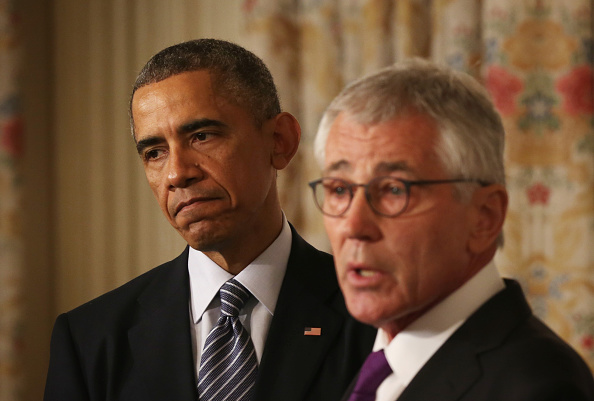
Last week, Defense Secretary Chuck Hagel declared that the U.S. war against the Islamic State in Iraq and Greater Syria was on track. “There’s no official review of any of the decisions that the President has made, or strategy,” Hagel told Charlie Rose.
This week, he’s out of his Pentagon job, even as the same old Obama Anti-ISIS Express continues barreling down that track.
So how much change can be expected following Hagel’s announcement Monday that he is leaving the Defense Department’s top civilian post after 20 months? Or, by handing Hagel his walking papers, is President Obama now suggesting his ISIS strategy is fine?
Washington immediately began debating the reasons for Hagel’s surprising departure. Obama supporters argued that Hagel’s low-key demeanor made him a good choice two years ago, when the issues were winding down wars and budget cuts, but ill-fitted to the offensive U.S. military push ISIS now needs. His backers blamed an insular National Security staff that shut him out of key decisions that led to bad blood between the White House and Pentagon.
Current and former Obama Administration officials say the problem was more policy than personnel. The roots of the problem, they say, are closer to the Oval Office—involving close-hold decision-making by Obama, Chief of Staff Dennis McDonough and National Security Adviser Susan Rice—than at the Pentagon.
“Not sure what kind of Kool-Aid they are drinking if they think that getting rid of Hagel—and not the National Security Advisor who’s flailing to handle the [ISIS] problem—is going to make things better,” one former Obama Administration official says.
Hagel’s leaving “is not an obvious fix for what seems to be ailing the administration,” says Peter Feaver, a civil-military relations expert at Duke University. When President George W. Bush eased out Defense Secretary Donald Rumsfeld in 2006 (also following a White House drubbing in midterm elections), it included changing strategy by sending a surge of U.S. troops into Iraq.
“But there doesn’t seem to be any interest in the Obama administration to change the strategy,” Feaver adds. “What we have here is a change in personnel, without a change in policy.”
Retired Army general Jack Keane, who advocated for the surge in Iraq, says the White House has meddled with Pentagon prerogatives as the ISIS threat has grown over the past year, including videotaped beheadings of five Westerners, three of them American. “The policy is wrong and Hagel was pushing back on it,” Keane says, confirming what some Pentagon officials say privately.
Defense officials say White House meetings on dealing with ISIS often ended without a decision, which would be made later by Obama, aided by National Security Advisor Susan Rice and her deputy, Ben Rhodes. “That’s very frustrating for a secretary of defense,” Keane adds, “who feels on the outside when it comes to issues that are in their domain.”
Rice has long been a target inside the administration, even as she garnered sympathy as a Congressional scapegoat in the post-Benghazi hullaballoo. “The problems reach much higher than the secretary of defense,” a second Obama national-security aide said.
Much of Capitol Hill concurs. “The President needs to realize that the real source of his current failures on national security more often lie with his Administration’s misguided policies and the role played by his White House in devising and implementing them,” Sen. John McCain, R-Ariz., said. He’s the likely next chairman of the Armed Services Committee, which will confirm Hagel’s successor. “That is the real change we need right now,” McCain said in a statement.
Hagel fought for a tougher approach in Syria, and wrote a recent memo to Rice calling for more clarity about dictator Bashar Assad’s fate. Assad’s continued hold on power has bedeviled U.S. strategy toward ISIS, which is one of several rebel groups seeking to overthrown him. “Hagel had been a bit more hawkish on Syria,” Feaver says. “Perhaps replacing him is an indication that the President’s not going to be moving in a more hawkish direction there.”
Fat chance. Republican lawmakers are making clear following Hagel’s announcement that they want a new strategy for dealing with ISIS, as well as a new secretary of Defense.
— With reporting by Zeke Miller
More Must-Reads From TIME
- The 100 Most Influential People of 2024
- The Revolution of Yulia Navalnaya
- 6 Compliments That Land Every Time
- Stop Looking for Your Forever Home
- If You're Dating Right Now , You're Brave: Column
- The AI That Could Heal a Divided Internet
- Fallout Is a Brilliant Model for the Future of Video Game Adaptations
- Want Weekly Recs on What to Watch, Read, and More? Sign Up for Worth Your Time
Contact us at letters@time.com